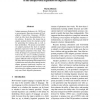Free Online Productivity Tools
i2Speak
i2Symbol
i2OCR
iTex2Img
iWeb2Print
iWeb2Shot
i2Type
iPdf2Split
iPdf2Merge
i2Bopomofo
i2Arabic
i2Style
i2Image
i2PDF
iLatex2Rtf
Sci2ools
ACL
2008
2008
Using Adaptor Grammars to Identify Synergies in the Unsupervised Acquisition of Linguistic Structure
Adaptor grammars (Johnson et al., 2007b) are a non-parametric Bayesian extension of Probabilistic Context-Free Grammars (PCFGs) which in effect learn the probabilities of entire subtrees. In practice, this means that an adaptor grammar learns the structures useful for generating the training data as well as their probabilities. We present several different adaptor grammars that learn to segment phonemic input into words by modeling different linguistic properties of the input. One of the advantages of a grammar-based framework is that it is easy to combine grammars, and we use this ability to compare models that capture different kinds of linguistic structure. We show that incorporating both unsupervised syllabification and collocation-finding into the adaptor grammar significantly improves unsupervised word-segmentation accuracy over that achieved by adaptor grammars that model only one of these linguistic phenomena.
ACL 2008 | Adaptor Grammars | Computational Linguistics | Non-parametric Bayesian Extension | Probabilistic Context-Free Grammars |
| Added | 29 Oct 2010 |
| Updated | 29 Oct 2010 |
| Type | Conference |
| Year | 2008 |
| Where | ACL |
| Authors | Mark Johnson |
Comments (0)

